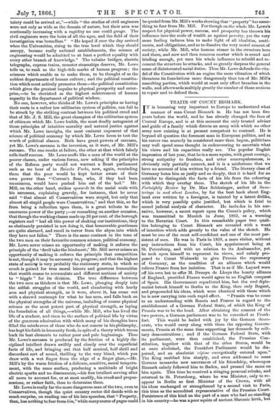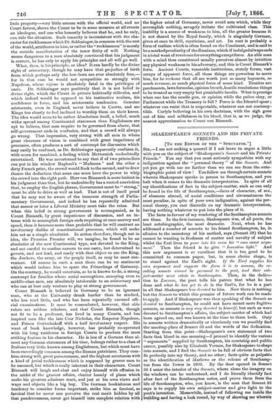TRAITS OF COUNT BISMARK.
IT is becoming very important to Europe to understand what manner of man Count Bismark is. He has not been five years before the world, and he has already changed the face of Central Europe, and is at this moment the only trusted adviser and guide of a family which directs an army with which no other army now existing is at present competent to contend. He is
beyond all question the foremost man in European politics, and as his career can scarcely be considered more than begun, politicians may well spend some thought in endeavouring to ascertain what his views and his capacities really are. The popular English impression of last year, that he is a mere squire, with great courage, strong antipathy to freedom, and utter unscrupulousness, is obviously only partially correct, and it is a misfortune that we have no account of him written by a friend. The literary class of Germany hates him so justly and so deeply, that it is hard for an outsider to distinguish the facts of his life from the colouring with which they overlay them. The sketch of his life in the
Fortnightly Review by Dr. Max Schlesinger, author of Smat-
terings in and about London, by far the beat book about Eng- land ever written by a foreigner, is tainted by a latent dislike, which is very possibly quite justified, but which is fatal to sound judicial analysis of character. He includes in his nar- rative, however, a secret report upon the Count's policy, which was transmitted to Munich in June, 1862, as a warning to the Bavarian Court. In this remarkable paper two quali- ties belonging to Count Bismark are revealed with a want of intention which adds greatly to the value of the sketch. He must be one of the most self-confident and one of the most per- sistent of men. He was in Paris in 1859, a mere visitor, without any instructions from his Court, his appointment being at St. Petersburg, and with no relation to its Ambassador, yet he took upon himself to represent its views, and calmly pro- posed to Count Waleswki to give Prussia the supremacy of Germany, as the condition of an alliance which would relieve France from her isolation. That is as if Mr. Layard were off his own bat to offer M. Drouyn de Lhuys the hearty alliance
of England, provided France would agree to an English conquest of Spain. His Government repudiated him; but the cool diplo-
matist betook himself to Berlin to the King, then only Regent, and propounded his ideas, which were identical with those which he is now carrying into such rapid effect. "Prussia was to come to an understanding with Russia and France in regard to the establishment of a German Federal State, of which the King of Prussia was to be the head. After obtaining the consent of the two powers, a German parliament was to be convoked at Frank- fort. This would be hailed with joy by the German demo- crats, who would carry along with them the opposing Govern- ments, Prussia at the same time supporting her demands by mili- tary demonstrations ; and if the German Federal State, with its parliament, were then established, the Prussian Con- stitution, together with that of the other States, would be at once abolished, the Frankfort Parliament would be dis- persed, and an absolutist regime energetically entered upon." The King snubbed him sharply, and even addressed to some German monarchs new assurances of his friendship, whereupon Bismark calmly followed him to Baden, and pressed the same on him again. This time he received a stinging personal rebuke, and returned to St. Petersburg, where he was Minister, only to re- appear in Berlin as first Minister of the Crown, with all his ideas unchanged or strengthened by a second visit to Paris, this time as the accredited representative of the Prussian Court. Persistence of this kind on the part of a man who had no standing in his country—he was a poor squire of ancient Slavonic birth, but little property—very little esteem with the official world, and no Court favour, shows the Count to be in some measure at all events an ideologue, and one who honestly believes that he, and he only, can rule the situation. Such tenacity is inconsistent with the cha- racter for recklessness which Dr. Schlesinger, in common with the rest of the world, attributes to him, or rather the "recklessness" is merely the outside manifestation of the inner fixity of will. Nothing seems dangerous to a man absolutely convinced that his judgment is correct, he has only to apply his principles and all will go well.
What, then, is his principle, or idea? It can hardly be the divine right of aristocracy, though he may have that prejudice of birth from which perhaps only the low-born are ever absolutely free,— for in that case he would not sympathize so strongly with Napoleon, whose regime is absolutely fatal to the privileges of caste. Dr. Schlesinger says positively that it is not belief in divine right, which the Count in private habitually ridicules, and which indeed would be opposed to his instinctive realism, his confidence in force, and his aristocratic tendencies. Genuine aristocrats, even in England, never believe in Courts, and see Kings too clearly to feel inclined to worship them on their knees. The idea would seem to be rather Absolutism itself, a belief, much wider spread among Continental statesmen than Englishmen are apt to believe, that men require to be governed from above, that self-government ends in confusion, and that a crowd will always go wrong. That impression, very strong with all men in whom great clearness of vision is combined with great impatience of processes, often produces a sort of contempt for discussion which may easily be confused, as Dr. Schlesinger apparently confuses it, with scorn for mankind, a feeling which Metternich undoubtedly entertained. He was accustomed to say that if of two printsellers one put in his window Raphael's " Madonna" and the other a dirty French print, the crowd would flock to the second, and to draw thence the deduction that some one must have the power to whip the crowd into the right path. Herr von Bismarck is more lenient in his judgment than that, but he undoubtedly has a rooted conviction that, to employ the English phrase, Government must be " strong," must be able to drive as well as lead. That is not of itself proof that he may not be aware of the immense strength of Parlia- mentary Government, and indeed he has repeatedly admitted that sooner or later a Liberal Ministry must take the reins. But when this belief in strong government is accompanied, as in Count Bismark, by great impatience of discussion, and an in- tense wish to accomplish foreign ends requiring at once secrecy and speed, then it becomes more than probable that he will contract an involuntary dislike of constitutional processes, which will make him act as a simple absolutist. In action therefore, though not in idea, the Prussian Premier will, we imagine, be found to be an absolutist of the new Continental type, not devoted to the King, and not careful to confine careers to one caste, but determined to govern, and not lead, and ready with that object to use the King, the Junkers, the army, or the people itself, as may be most con- venient. Of course in such a man there can be no sentiment which would induce him to spare the Princelings of Germany. On the contrary, he would entertain, as he is known to do, a strong contempt for families whose social assumptions, annoying even to middle-class men, are absolutely intolerable to an aristocracy and who can at best only venture to play at strong government.
Count Bismark is believed in Germany to be an ignorant man, who at the University drank harder than he studied, who has read little, and who has been repeatedly excused offi- cial examinations. It must be remembered, however, that able rulers are seldom scholars, and that Count Bismark, though not fit to be a professor, has lived in many Courts, and has inspired men like the late Czar Nicholas, the Emperor Napoleon, and Prince Gortachakoff with a half involuntary respect. His want of book knowledge, however, has probably co-operated with his long residence in foreign Courts to produce the most striking feature in his character. He is less of a German than al- most any German statesman of •his time, belongs rather to a class of Italiims very little known among Englishmen, but which must have been exceedingly common among the Roman patricians. They com- bine strong will, great perseverance, and the highest astuteness with a kind of jovial recklessness which is supposed by graver men to be assumed, but which is really inherent in their characters. Count Bismark will laugh and chat and enjoy himself with effusion in the midst of the gravest affairs, chatter loosely of plans which make his greatest admirers start, and jest at his own views and ways and objects like a big boy. The German bookishness and tendency to consider forms important, strike him as farcical, so farcical that he never can perceive the real merit hidden by all that ponderousness, never get himself into complete relation with
the higher mind of Germany, never avoid acts which, while they accomplish nothing, savagely irritate the cultivated class. This inability is a source of weakness to him, all the greater because it is not shared by the Royal family, which is singularly German, given at once to drill, mysticism, and art. Its root is probably a form of realism which is often found on the Continent, and is said to be a markedpeculiarity of the Russians, which if indulged always ends in atotal want of reverenceforeverythingexceptforce. An able man with a mind thus constituted usually perceives almost by intuition any physical weakness in his adversary, and this is Count Bismark's forte. Ancient Courts, venerable institutions, stately forms, vast arrays of apparent force, all these things are powerless to move him, for he reckons that all are worth just so many bayonets, so much revenue, so much physical force of some kind. Treaties are parchments, laws formulas, opinion breath, hostile resolutions things to be treated as very empty but punishable insults. What is prestige when one has the needle gun, or opinion while the police obey, or Parliament while the Treasury is full ? Force is the Ithuriel spear ; whatever can resist that is respectable, whatever can not contemp- tible. Carlyle believing in his own doctrines, with the sigh gone out of him and selfishness in his blood, that is, as we judge, the nearest approximation to Count von Bismark.































 Previous page
Previous page